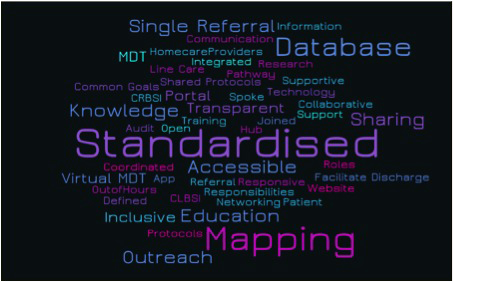BAPEN News
Calling all BAPEN Members…
BAPEN Executive positions – Apply by 11th May 2018
Are you curious? Do you like working collaboratively? Well why not apply for one of the BAPEN Executive positions?
The BAPEN President Elect and Shadow Treasurer positions are now available to apply for and some information about each is below, however should you wish to speak to the current Treasurer or President about the roles or anyone else on BAPEN Executive please also get in touch via secretary@bapen.org.uk or contact the individuals directly.
Deadline for both applications is Friday 11th May 2018
BAPEN President Elect
BAPEN seeks candidates for the President Elect post. This is an honorary post with a normal tenure of one year, leading on to three years as President. With BAPEN’s twin emphases on malnutrition and nutritional support, the potential for the future activities of the organisation is exciting. The role of the President in driving the organisation forward is key.
The President chairs five to six executive and three council meetings per year and is responsible not only for leading the organisation forward but also for networking with our many partners. During the President Elect year the individual becomes more familiar with the current activities of BAPEN by involvement in the Executive Committee and Council and begins to formulate his/her strategy for the term as President. He/she may also support the current President in attending meetings or speaking engagements.
Enquiries and applications to secretary@bapen.org.uk or simon.gabe@nhs.net by Friday 11th of May. Applications should include a CV in addition to a 200 word account of the applicant’s suitability for the role.
BAPEN Shadow Treasurer
BAPEN seeks candidates for the Shadow Treasurer post. This is an honorary post with a normal tenure of 6 months, leading on to three years as Treasurer. The treasurer is responsible for reviewing the accounts provided by the BAPEN office, authorising invoices and expenses claims and is the designated industry link on BAPEN executive.
Enquiries about the role can be made to the current treasurer Dr Nikki Burch nicola.burch@uhcw.nhs.uk and applications should be made to secretary@bapen.org.uk by Friday 11th of May. Applications should include a CV in addition to a 200 word personal statement explaining your suitability for the role
Your involvement is important to us because together we can make a difference.
BAPEN Welcomes New APPG Hunger Report
BAPEN welcomes the publication of the All Party Parliamentary Group (APPG) on Hunger’s report ‘Hidden hunger and malnutrition in the elderly’ and the increased focus that this places on nutrition and hydration in the elderly.
The report highlights the growing problem of malnutrition in the elderly and finds in the decade from 2005-06 to 2015-16 the number of people aged 60 and above admitted to hospital with a primary diagnosis of malnutrition more than trebled.
The report recommends that Government should ensure that at all levels of care, staff are trained to use the BAPEN’s Malnutrition Universal Screening Tool (‘MUST’) to identify older people who are at risk of malnutrition and ensure that they receive the appropriate nutritional support to improve their condition.
Commenting on the report, Dr Simon Gabe, BAPEN President said: “The findings of this report highlight the scale and impact of malnutrition amongst older people in England and we welcome the call for greater uptake of ‘MUST’ (the Malnutrition Universal Screening Tool) by health and social care professionals in both acute and community settings.
Data from BAPEN’s Nutrition Screening Week surveys has shown that almost 30% patients admitted to hospitals in the UK are at risk of malnutrition. Many of those at risk, whether they have disease related malnutrition or are malnourished because of social or environmental factors, could have been identified and treated in the community. We would like to see older people have greater access to information about eating well and be signposted to the BAPEN Malnutrition Self-Screening Tool which is available free online, and is designed to help people identify their own risk of malnutrition.
We are also calling on the Care Quality Commission to include questions on nutrition and hydration care provision in its inspections of domiciliary care providers and GP practices. We would also like to see more Nutrition Steering Committees to guide and support community settings on nutrition and hydration policy and provision and to ensure pathways are in place in each setting.
There is a clear need to identify more people who are malnourished early, so that action can be taken sooner to support their recovery and to minimise harm. In order to achieve this, nutrition needs to be built into conversations at every level of the health and social care system, so that people who need help can be identified and supported appropriately. Adequate social care funding is necessary, and we believe increased investment in social care and the social networks that support older people is likely to result in cost savings associated with the management of malnutrition.
As the report identifies, social isolation and loneliness can lead to some older people becoming malnourished. BAPEN is urging local Healthwatch organisations and the equivalent bodies in Wales, Northern Ireland and Scotland to look at what access older people have to luncheon clubs and voluntary support networks. BAPEN welcomes the Government’s recent appointment of a ministerial lead for loneliness, and its commitment to develop a cross-Governmental strategy to tackle loneliness. BAPEN looks forward to working with the Government to develop their strategy and ensure that processes are in place to tackle malnutrition that is associated with isolation and reduced access to food.”
To read the report, click here.
2017 BAPEN Conference Presentations Now Available
BAPEN Members are now able to view the presentations for the 2017 BAPEN Conference.
Visit: www.bapen.org.uk/resources-and-education/meetings/annual-conference/2017-conference-presentations
A Report from the CLIFNET (Coventry-Leicester Intestinal Failure Network)
Melanie Baker, Senior Specialist Dietitian, BAPEN Regional Rep – Trent
The 26th September saw the inaugural CLIFNET meeting, with more than 50 attendees, from over 16 trusts, across the Midlands. There was a good multi-professional mix with >50% SpR and consultants, alongside dietitians, nurses, pharmacists and homecare HPN providers.

The educational part of the day focused on IF/HPN, with informative talks on aspects such as palliative HPN, psychology, as well as key presentations around managing HPN. The afternoon provided the opportunity to discuss setting up a regional network and next steps.
The word cloud (to the left) demonstrates a shared enthusiasm for networking with a plan to develop resources, a joint database/website and agreed management pathways to improve patient care.
Further information, including presentations from the day, can be found at is https://clifnet.org

BAPEN Interview the Directors of NNEdPro
What is your role in NNEdPro and how did you become involved?

Dan Del Rio:
In NNEdPro I act as Scientific Director. Basically, I am the person bringing into the picture the basic science component and I supervise and direct the actions linked to scientific research. I became involved after meeting our Chair, Prof. Shumone Ray, at a conference in Italy. We immediately realised the complementarity of our works and he invited me over to Cambridge for a seminar….then one thing led to another….and here I am.

Pauline Douglas:
I am Education Director and Governance Lead. I am an Registered Dietitian; Senior Lecturer at Ulster University; represent my professional body on various committees and also on European and International committees, e.g. on executive committee if European Federation of Associations of Dietitians (EFAD); lead on European Healthy Hydration Awareness Campaign; am a partner with the statutory regulator for dietitians, the HCPC.
I have been involved with NNEdPro almost from inception and from the time of the Council of Europe Alliance and the creation of the 10 Key Characteristics of Good Nutritional Care where I met Shumone, who was the medical representative on the group.

Minha Rajput-Ray:
I serve as Medical Director and Wellbeing Lead, overseeing the interdisciplinary nature of our projects across the globe. Around 10 years ago, when as a junior doctor I witnessed a patient having complications due to refeeding syndrome. Since I had not had much nutrition teaching in medical school, having 'spotted the gap' and as highlighted at the time by The Council for Europe, Nutrition Action Plan and GMC's Tomorrow's Doctors consultation, I was able to team up with Sumantra Ray Hence, supported by like-minded Dietetics colleagues, Pauline Douglas (Chair of the BDA 2007), Joan Gandy and Rick Wilson and the NNEdPro journey continues.

Sumantra (Shumone) Ray:
I am the Founding Chair and Executive Director of the NNEdPro Global Centre for Nutrition and Health. I am a Licensed Medical Doctor and a Registered Public Health Nutritionist. I hold a number of Honorary Professorial appointments across several Universities in the UK, Canada, Australia and India, in Nutrition, Public Health and Medicine, and am a Governing Body Fellow of Wolfson College at the University of Cambridge, which is our anchor institution and where I am a Course Director in Applied Human Nutrition. Outside work, I’m a science-fiction film buff and love going to the movies with my daughter amongst other things!
What is NNEdPro and how did it start?

Shumone:
NNEdPro stands for the Need for Nutrition Education/Innovation Programme (UK). It started as a project in 2008 and became a programme in 2011, further evolving into a centre in 2016. I first recognised the need for NNEdPro in 2001 when I conducted a survey amongst doctors in different specialities relating to nutrition and this was presented at an international conference in 2002, which led me to believe that there was a widespread unmet need. This was further galavanised as I met Minha at Ninewells Hospital and Medical School Dundee and during my involvement in the Council of Europe Alliance 2005-7 leading to the DH Nutrition Action Plan that officially gave rise to NNEdPro.
What is the vision/mission for NNEdPro?

Minha:
As we have scaled our operations, at the NNEdPro Global Centre for Nutrition and Health we bring together our award-winning, international and interdisciplinary think-tank, training academy and knowledge network in Advancing and implementing nutrition knowledge to improve health, wellbeing and society. This is through various platforms, for example our annual Summer School and Summit, contribution to conferences, quality teaching in medical schools and our grassroots nutrition education Teaching Kitchens initiative.
What is NNEdPro’s ultimate goal?

Minha:
To be able to make Medical Nutrition Education and Implementation accessible and scalable within every healthcare setting globally. This would be in line with the UN Sustainable Development Goals and United Nations Decade of Action on Nutrition 2025.
Briefly tell us what happened at the NNEdPro International Summit?

Dan:
A lot of people met at the summit and listened to amazing examples of nutrition education and research. A multidisciplinary and complete experience that left everybody enriched and enlightened!
How can BAPEN members get involved or contribute to NNEdPro?

Pauline:
Nutrition education is so important to ensure we can best support patients/ service users in our care and also for the population as a whole. This must be a multi-professional approach. Dietitians have a key role in educating other members of the healthcare team about nutrition and also leading on nutritional aspects of care or creation of care pathways. Most importantly, it is important to tell HCPs how they can gain access to dietetic care. For others in BAPEN to encourage active engagement with nutritional aspects of care. So, interested parties can share their work in the area of nutrition education, become part of the membership of NNEdPro so as and when opportunities arise they can contribute.
What is next for you with NNEdPro?

Dan:
Well, I foresee a growing NNEdPro, where basic research will meet with evidence synthesis and with its real final target…translation and application into public health policy! This is what I see when I think about the future of NNEdPro!

Pauline:
Continue to develop the NNEdPro profile with specific reference to education and educational resources to promote the importance of educational wellbeing of all.

Minha:
NNEdPro were the winners of the ESPEN MNI Award for 2017. We are planning to design bespoke, cross-disciplinary educational programmes on nutrition that actively engages patients and carers to target malnutrition in the acute hospital and the community. This will involve BAPEN and other stakeholders as part of The International Knowledge Application Network in Nutrition Project 2025 (I-KANN 25). This is a joint initiative of NNEdPro with the Global Open Data initiative for Agriculture and Nutrition (GODAN), supported by the Food Authenticity Network – Laboratory of the Government Chemist (LGC). Essentially, I-KANN-25 will promulgate high quality, scalable nutrition education to achieve sustained impact in global healthcare systems.

Shumone:
We are all set to celebrate NNEdPro’s 10th Anniversary Year in 2018, which will be an excellent time to role out the project supported by our MNI award working closely with BAPEN to promulgate medical nutrition education across the NHS in England. At the same time, reflecting back over the past decade we are gearing up with a strategy that allows u to embrace the challenges ahead in line with the UN Decade of Action 2025, with equal proportions of work to be done in both developed and developing worlds alike.
What is the next conference that you are going to and why?

Dan:
I have recently been invited to the Bioavailability 2018 conference (www.elsevier.com/events/conferences/bioavailability), held in Norwich next September, as a plenary speaker. I will attend other meetings in the meantime (like, for example, the AAT-AD/PD, on neurodegenerative diseases, held in Turin next March, also as an invited speaker). I’m traveling a lot (too much?).

Pauline:
I have been a speaker and delegate at a number of conferences in the past few months so trying to lay low just now to continue my own research for my PhD.

Minha:
RSM 22nd January 2018. Non-communicable diseases: Prevention and management in contemporary crisis and conflict zones.

Shumone:
NNEdPro (mostly including myself as well) has had a key presence at innumerable conferences and scientific meetings across continents in recent years. However, the next invited presentation that I am looking forward to delivering is at the BMA Board of Science on 1st February on the personal request of Dame Professor Parveen Kumar. This will mark the start of our 10th Anniversary year but is also special as over 10 years ago, Professor Kumar gave us the encouragement and mentoring support as president of the BMA which spurred us on to form the NNEdPro group, so this is something of a full circle.
Where do you live?

Dan:
I live in Italy, in Parma! If you never heard of Parma you might although have heard of the Parmesan Cheese or the Parma ham! Amazing place!!

Pauline:
Northern Ireland.

Shumone:
In a place called ‘The Orchards at Cherry Hinton’, in historic Cambridge, where there is an abundance of cherry and apple trees (remaining from the original Orchards!) helping to increase our fruit intake over the summer!
What place should people go to or what should they do if they visit the area in which you live?

Dan:
They should most definitely visit our restaurants…..as the food is amazing!!

Pauline:
Oh there are so many to choose from – Strangford Lough, Giants Causeway,
Mountains of Mourne, Titanic centre. Just come for more than a few days and visit
as much as you can.

Shumone:
Well there are 31 Colleges to see (including iconic King’s or well-kept secret, Selwyn where I studied many years ago!) and over 10 museums all steeped in history and of course an architectural kaleidoscope, not to mention all the characters associated with Cambridge which come to life if you take a punt down the river Cam or if you’re feeling more edgy then take the ghost tour. But Cambridge and its surrounding areas also boast some pleasant natural settings, such as Grantchester, ideal for long walks when the weather permits!
What is the book you are reading at the moment or would like to read?

Pauline:
Not reading one at the minute but when I get a chance it is from a diverse range of Steve Robinson, Lindsay Buroker, Becca Andre, Simon Toyne, Fiona McIntosh to mention a few.

Minha:
Poverty And Famines: An Essay on Entitlement and Deprivation by Amartya Sen.

Shumone:
I love fiction as well as poetry of various descriptions (both reading and writing!)… but at the moment I am (somewhat painfully!) trying to read my own book (Oxford Handbook of Clinical and Healthcare Research) in order to develop course materials from it and I would be delighted with any comments or suggestions if you have them!
What is your favourite meal?

Dan:
As an Italian…..there are many foods I like. But a good plate of cappelletti in winter could win them all!

Minha:
Home-made vegetable paneer rice.
